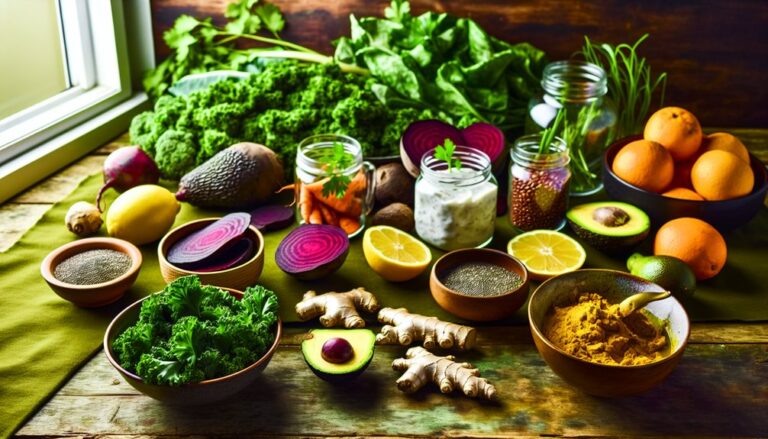
senior fitness videos youtube;senior shape fitness youtube;free senior fitness workouts;senior fitness centers near me;senior fitness exercises routines

When you consider liver detox diets, you might find yourself weighing their potential benefits against some serious drawbacks. On one hand, these diets can encourage healthier eating habits and may support your liver’s function. On the other hand, you could face nutritional deficiencies and other health issues from overly restrictive practices. It’s crucial to examine the science behind these diets and understand who might be better off avoiding them altogether. So, what’s the real truth about detoxing your liver, and could there be a more balanced approach?
Listen to this Article
Key Takeaways
- Liver detox diets may lead to short-term weight loss and improved digestion due to reduced calorie intake and elimination of processed foods.
- Whole food incorporation in detox diets can enhance liver health and reduce the risk of fatty liver disease.
- Significant dietary restrictions may cause nutritional imbalances, fatigue, and digestive issues during the adjustment period.
- Limited scientific evidence supports the effectiveness of detox diets, as the body naturally detoxifies through the liver’s mechanisms.
- Pregnant women and individuals with chronic illnesses should consult healthcare professionals before considering detox diets to avoid potential health risks.
What Is a Liver Detox Diet?
Liver detox diets have gained popularity in recent years, often marketed as a way to cleanse the liver and improve overall health. Fundamentally, these diets typically involve short-term eating plans that emphasize specific foods or nutrients believed to support liver function. They often include fruits, vegetables, lean proteins, and herbal supplements while eliminating processed foods, alcohol, and sugars.
When you consider a liver detox diet, it’s vital to recognize the impact of lifestyle factors and dietary choices on liver health. Chronic alcohol consumption, obesity, and high sugar intake can lead to liver damage, making it important to adopt healthier habits. A detox diet may help you shift towards more nutritious options, but its efficacy as a cleansing method remains debated among experts.
It’s also worth noting that your liver is naturally capable of detoxifying itself. Instead of relying solely on detox diets, focusing on a balanced diet and maintaining a healthy lifestyle can provide long-term benefits.
You might find that integrating whole foods, regular exercise, and proper hydration contributes considerably to liver health without the need for extreme dieting practices.
Potential Health Benefits
Following a liver detox diet can offer several potential health benefits, particularly when it encourages healthier food choices and lifestyle changes. One of the primary advantages is the positive dietary impact on liver health. By incorporating whole foods, such as fruits, vegetables, and whole grains, you provide essential nutrients that support liver function and promote detoxification processes.

Additionally, a liver detox diet often reduces the intake of processed foods, sugars, and unhealthy fats. This shift can lead to weight loss, which is important because maintaining a healthy weight is linked to improved liver health. Studies suggest that excess body weight can lead to fatty liver disease, so adopting a detox diet may help mitigate this risk.
Moreover, by focusing on hydration and increased water intake, you can enhance your liver’s ability to filter toxins. This practice may also improve overall well-being, as proper hydration is essential for numerous bodily functions.
Common Ingredients Used
When you commence a liver detox diet, you’ll likely encounter a variety of common ingredients that are touted for their health benefits. These ingredients often aim to support liver function and promote overall wellness. Here are some key components you might come across:
- Herbal supplements: Ingredients like milk thistle and dandelion root are popular for their potential liver-supporting properties.
- Detox teas: Many detox teas contain a blend of herbs and antioxidants designed to aid in liver health and overall detoxification.
- Fermented foods: Foods like kimchi and sauerkraut are rich in probiotics, which can help maintain gut health and support nutrient absorption.
- Fiber sources: Foods high in fiber, such as fruits, vegetables, and whole grains, can enhance digestion and facilitate the elimination of toxins.
In addition to these ingredients, you’ll also find juice cleanses that provide a concentrated source of vitamins and minerals, while focusing on nutrient timing and meal frequencies to optimize your detox process.
Incorporating antioxidant-rich foods into your diet can further bolster your liver’s ability to detoxify and maintain health.
Risks and Side Effects
Detox diets can come with a range of risks and side effects that you should be aware of before starting. Many detox myths promote the idea that these diets can drastically improve liver function and eliminate toxin buildup, but this isn’t always the case.

Significant dietary restrictions may lead to nutritional imbalances, which can adversely affect your overall health. For instance, cutting out entire food groups can impact your metabolic health and digestive health, potentially leading to deficiencies in essential vitamins and minerals.
You might also experience fatigue, headaches, or digestive issues as your body adjusts to these lifestyle changes.
It’s essential to recognize that detox diets often don’t cater to individual needs, which can exacerbate existing health conditions. Furthermore, the rapid results some people seek mightn’t be sustainable and can lead to yo-yo dieting, further harming your nutritional balance.
Understanding these risks can help you make informed decisions. Instead of extreme detox diets, consider gradual lifestyle changes that support your liver function and overall well-being.
Prioritizing a balanced diet and consulting healthcare professionals can guide you away from common health misconceptions.
Scientific Evidence
When you look at liver detox diets, you’ll find limited research supporting their effectiveness.

Understanding the body’s natural detoxification mechanisms is essential, as the liver already plays a key role in processing and eliminating toxins.
This raises questions about the necessity and efficacy of these diets in promoting liver health.
Limited Research Studies
Research surrounding liver detox diets remains limited, making it difficult to draw definitive conclusions about their effectiveness. While some proponents claim these diets can promote liver health, scientific evidence supporting these assertions is scarce. You may encounter various opinions, but the lack of rigorous studies creates significant research gaps.
Consider the following points about the current state of research on liver detox diets:
- Limited detoxification: The body already has natural mechanisms for detoxification, raising questions about the need for specialized diets.
- Insufficient clinical trials: Most studies are small-scale or anecdotal, lacking the robustness needed for generalization.
- Potential biases: Many studies may come from organizations with vested interests, skewing the findings toward positive outcomes.
- Varied diet approaches: Different detox diets may have conflicting recommendations, further complicating the research landscape.
Until more thorough studies are conducted, it’s crucial to approach liver detox diets with caution. You should weigh the claims against the limited scientific backing to make informed health choices.
Detoxification Mechanisms Explained
The human body continuously engages in complex detoxification processes that effectively eliminate toxins and maintain overall health. One of the primary organs involved in this process is the liver, which plays an essential role in detox pathways.

These pathways consist of a series of biochemical reactions that transform harmful substances into less toxic compounds, which can then be excreted from the body.
Liver function is important for breaking down drugs, alcohol, and environmental toxins. It employs two main phases of detoxification: Phase I, which involves oxidation, reduction, and hydrolysis, and Phase II, where the liver conjugates these compounds, making them water-soluble for easier elimination.
Research indicates that a well-functioning liver can manage typical toxin exposure without the need for extreme detox diets.
However, factors like poor diet, alcohol consumption, and environmental pollutants can hinder liver function, potentially overwhelming detox pathways.
While some detox diets claim to enhance liver detoxification, scientific evidence supporting these claims is limited. Instead of drastic diets, focusing on a balanced diet rich in antioxidants, fiber, and hydration might be a more effective approach to support your liver’s natural detoxification capabilities.
Short-Term Vs. Long-Term Effects
Liver detox diets can produce a variety of short-term and long-term effects that significantly impact your health. In the short term, you might experience benefits like weight loss, increased energy, and improved digestion.

These short-term benefits can be appealing, but it’s vital to weigh the long-term sustainability of such diets. Often, extreme detox diets are difficult to maintain, leading to potential nutritional deficiencies.
Here are some effects to keep in mind:
- Short-term weight loss: Often due to reduced calorie intake.
- Improved energy levels: Can result from eliminating processed foods.
- Enhanced digestion: Many people report feeling lighter and less bloated.
- Potential nutrient deficiencies: Long-term detox diets might lack essential nutrients.
While you may enjoy immediate results, it’s important to assess whether the detox approach is sustainable for you over time.
Relying solely on detox diets can lead to a cycle of yo-yo dieting, ultimately affecting your overall health. A balanced diet with a focus on whole foods may offer a healthier, more sustainable alternative in the long run.
Who Should Avoid Detox Diets?
Certain individuals should steer clear of detox diets due to potential health risks and adverse effects. If you’re a pregnant woman, it’s especially essential to avoid these diets. During pregnancy, your body requires key nutrients to support both your health and the development of your baby.
Detox diets often involve restrictive eating patterns that can compromise nutrient intake, leading to negative consequences for both you and your child.

Additionally, if you have a chronic illness, such as diabetes, heart disease, or liver conditions, detox diets can pose significant risks. These diets may disrupt your medication regimen or lead to dangerous fluctuations in blood sugar levels, which can complicate your condition.
The restrictive nature of detox diets can also be harmful, as your body may need a consistent intake of certain nutrients to manage your illness effectively.
Before considering any detox diet, it’s important to consult with a healthcare professional, especially if you fall into these categories.
Prioritizing a balanced, nutritious diet tailored to your specific health needs is far more beneficial than engaging in a detox regimen that could jeopardize your well-being.
Alternatives to Detox Diets
Instead of detox diets, you might consider a whole foods approach that emphasizes nutrient-rich foods.
Staying hydrated and maintaining adequate water intake is vital for supporting liver function.

Additionally, balanced nutritional plans can provide your body with the essential vitamins and minerals it needs without the extremes of detox diets.
Whole Foods Approach
Many nutritionists advocate for a whole foods approach as a sustainable alternative to detox diets. This method emphasizes consuming unprocessed, nutrient-dense foods that support overall health and specifically enhance liver health.
By focusing on whole foods, you’re more likely to provide your body with the vitamins, minerals, and antioxidants it needs to function effectively.
Consider incorporating the following elements into your diet:
- Fruits and Vegetables: Packed with fiber and antioxidants, they help reduce inflammation and support liver function.
- Whole Grains: Foods like quinoa, brown rice, and oats provide essential nutrients while promoting steady energy levels.
- Lean Proteins: Sources like fish, chicken, and legumes aid in tissue repair and provide amino acids vital for liver health.
- Healthy Fats: Avocados, nuts, and olive oil can reduce liver fat and improve overall metabolic function.
Hydration and Water Intake
A balanced diet rich in whole foods can greatly enhance your body’s natural detoxification processes, but hydration plays an equally important role in supporting liver health. Ensuring you drink enough water daily can maximize the hydration benefits for your liver and overall well-being.
Adequate hydration helps your liver flush out toxins more efficiently, aiding in metabolic processes and preventing the buildup of harmful substances.

You can obtain water from multiple sources, including plain water, herbal teas, and fruits and vegetables with high water content, such as cucumbers and watermelon.
Aim for at least eight 8-ounce glasses of water daily, though individual needs may vary based on activity level and climate. Staying hydrated can improve digestion, support nutrient absorption, and enhance energy levels, which are all essential for peak liver function.
Incorporating a variety of water sources into your daily routine can also make hydration more enjoyable.
Balanced Nutritional Plans
While detox diets often promise quick results, balanced nutritional plans offer a sustainable approach to liver health and overall well-being.
By focusing on meal planning and nutrient balance, you can support your liver without the extremes of detox diets. A well-rounded diet nourishes your body, enabling the liver to function effectively.
Consider incorporating these elements into your balanced nutritional plan:

- Whole Foods: Prioritize fruits, vegetables, whole grains, and lean proteins to provide essential nutrients.
- Healthy Fats: Include sources of omega-3 fatty acids, such as fish, walnuts, and flaxseeds, to reduce inflammation.
- Adequate Fiber: Aim for high-fiber foods like beans, legumes, and leafy greens to support digestive health.
- Moderate Alcohol Intake: Limit alcohol consumption to reduce strain on the liver.
Making an Informed Choice
When considering a liver detox diet, it’s crucial to weigh the potential benefits against the risks involved. While some people report feeling more energized and healthier after these diets, scientific evidence on their effectiveness is limited. Many detox diets may lead to short-term weight loss but often fail to promote sustainable lifestyle changes.
You should focus on mindful eating instead. This means being aware of what you consume and making choices that support your overall health. Incorporating whole foods, such as fruits, vegetables, lean proteins, and whole grains, can provide your liver with the nutrients it needs without the extremes of a detox diet.
Additionally, it’s important to stay hydrated and avoid excessive alcohol and processed foods, which can harm your liver. Before making any drastic changes to your diet, consider consulting a healthcare professional. They can offer personalized advice based on your health history and lifestyle.
Ultimately, making an informed choice involves understanding your body’s needs and recognizing that a balanced, sustainable approach to nutrition often yields better results than short-term detox diets.
Conclusion
To sum up, while liver detox diets can promote healthy eating habits, their benefits may not outweigh the risks for everyone. Curiously, a study found that around 70% of people who try detox diets experience negative side effects like fatigue and digestive issues. It’s crucial to approach these diets with caution and consider alternatives that support liver health, such as a balanced diet and regular exercise. Making informed choices can lead to better long-term wellness without unnecessary restrictions.







